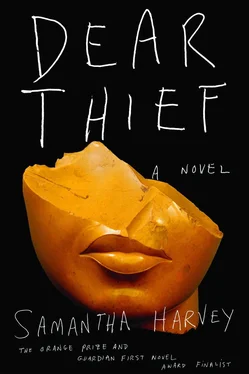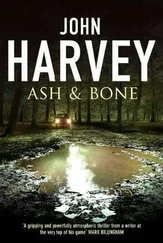You know it is said, and has been proven, that people are more likely to die when they are left alone, a fact I didn’t know then but must have sensed in some way, because during my reading of ‘The Burden’, which was not more than a couple of paragraphs long, my grandmother closed her eyes again and prepared herself for what it was she now saw coming. I did wait; I waited by her feet for an hour and did nothing but hear her breaths and pre-empt the last one. Sometimes there was a gap of fifteen or twenty seconds after the exhale when I was so sure it was the end that I’d grip her hand tighter in farewell — and then a sudden gasp and the air would go back in again. Each time this happened I became more tense and almost irritated until it felt as though I were willing her to die faster. So eventually I kissed her forehead, put on a dress and took myself outside.
She lived by the river a way downstream from Woolwich Arsenal and upstream from the old firing range at Rainham Marshes. A pacifist sandwiched by war, she used to say. She had a grand, decrepit terraced house in one of the wharfs before they were demolished and turned into what they call luxury dwellings. When we were children she would climb down the bouldered flood wall with us and take us onto the beach, and we’d walk or run in swirls following the oil that had marbled the mud and sand — and we weren’t to tell our parents, who had forbidden us to go anywhere near that quick and filthy shore.
Because the summer was hot and the river low I was able to walk right along the water’s edge that night of my grandmother’s death. If you want to guarantee staying alive, my grandmother used to insist, you must stay high on the foreshore so that you don’t get sucked into the mud. I went a long way east towards the marshes, walking an imaginary plank in the dusk.
Across the river there was the open scrub-land and what looked like a huge shadow cast by nothing — the Gallions Hotel, where, in times past, people would stay before getting on steamships to India, to China. Just here the Thames is half river, half sea. A thousand pale horses frothing at the bit. It is close to a mile wide, they say, and usually churning and milky, with a driving wind; they also say that there is a primordial forest under the water where it bends at Gallions Reach and that the current swells over rotted upturned roots.
But on this night it was differently milky, it was low and languid as if basking. Maybe this was when the gauze started to show itself and things began to lose their ordinariness, with the moon fattening in the night heat and everything quietly expanding. On its south bank there is a stretch, or at least there was then, where a patch of woods and thicket comes all the way down to the shore so that, with the warmth, the sand, the silver light and the curious stillness, you feel like you could be somewhere tropical. A shifting, a partial collapse; I don’t know. I might have just as easily been with my parents in India, or they might have stepped out of the trees barefoot onto the beach, my mother with her tan and Amazonian height, my father quiet and rangy behind her.
Just after the trees the river kinks right and the beach is narrow or sometimes gone, and every time I had walked that far before I hadn’t been able to get any further. You can climb up from there and then drop back down to the shoreline after the kink, where the beach is wide, maybe at its widest, which is what I’d always done. That night was the first time I’d walked right round the corner of the river, and it was there that I found — or anyhow found myself walking on — something that wasn’t sand or stone, but bones.
When you trod on them they gave a civil clink like a knife tapping a fork or a porcelain cup shaking in a saucer. They were hip bones, femurs, shin bones, tiny pivoting joints, a ball without a socket and a socket without a ball, the smooth plates of kneecaps, long scooped jawbones that belonged to something probably bovine, or maybe equine. It wasn’t a scattering, either, but a pile that had lodged itself in the moonlit sedge by the flood wall.
I put some of them out on the sand. They had a low, resigned calm. Nicolas has since wondered if they were from an old glue factory that had been upriver, on the Isle of Dogs, and had washed up at the kink where the current is forced to shift direction. Just a guess, though. Possibly they had sat on that shelf of the riverbed for years and had only been exposed by the low tide. Or maybe they hadn’t been washed up but had been dumped there, though who would bother? And what for? One way or another they must have been in the Thames for a long time, given how smoothed off they were by water and how hollowed and porous, as much shell as bone.
They were greyish-white and washed clean. These most functional of things, but so abstract when you look at them out of context. They could be sculptures. So I mused for a while on how beautiful they were, with a kind of self-conscious appreciation that annoys me, because really I am only thinking of how sensitive I am to be able to see their beauty. I scooped them up into my dress. I was overcome by them. Everybody is aware that the Thames is a great swallower of bodies and much loved by the suicidal, and that corpses and parts of corpses do wash up on its shores — but this wasn’t the case here. May it be known that when I took them I knew without doubt that they were not human, and that if they had been human my feeling wouldn’t have been what it was.
I filled the sling made by the lap of my dress and walked home to my grandmother’s like that, with my skirt gathered up in my fist. My grandmother was dead when I got back, as I knew she would be. I poured my hoard onto the bed in the spare room she always kept ready for family visits, and then I sat at her feet and put my head in her lap. My parents later railed at me for leaving her there in the rocking chair all night and said I should have reported her death straight away, but I saw no rush, I see none now, and I would not do it differently if I had the time again. Her death was so powerful and calm a presence in the room — the same calm I mentioned in relation to the bones on the shore — that it felt as though her life and all its interminable errands and demands and dramas had waited for this ecstatic moment of its own end, so that it could revel a little in that end, so that it could know that all of those seemingly interminable things did eventually terminate. And it could be comforted by that and rest in its own familiar space in the rocking chair by the lamp with its dog, for a while longer at least.
And so, this gauze. When you talked about it before, did you mean that sometimes, very occasionally, everything that had appeared very solid about the world loses substance? I mean, one is sitting there perhaps, on the bed on a hot night with crossed legs, and there is an inversion. One feels — or I should say, I feel — as if I could put my hand through the window glass or the wall as easily as through fog, and yet I can barely lift my arm and move it through air. This is because it seems that there is no point. I seem to be only air myself, and there is no point in shunting air through air. Nothing to achieve in that. Is this the kind of thing you mean?
For example, I look at the bones I collected in what might have been a dream — except it cannot have been a dream because the bones are there in front of me — and I do not recognise them as bones at all, but as arbitrary groupings of matter that have no past or future or meaning of any kind. My own bare knee fits this category too, and I stare for half an hour at the orange street light that glows off the curve of the kneecap.
I feel no grief at the death of my grandmother because life as I’d always known it shows itself now as only the negative space made by a much vaster reality. When I think of my grandmother in the room directly below, fundamental and as still as a root, she is perfect in my mind’s eye and the more my mind looks, the more she too becomes a grouping of matter, unassigned and timeless. To say she is dead is senseless, just as senseless as it is to say I myself am alive.
Читать дальше












